Dental Implant in South Korea
Search and Compare the Best Clinics and Doctors at the Lowest Prices for Dental Implant in South Korea
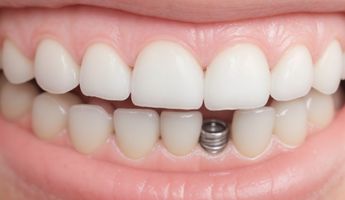
Find the best clinics for Dental Implant in South Korea
With Medijump you can browse 12 facilities offering Dental Implant procedures in South Korea. The cheapest price available is $562 in Ilsan. And for the cheapest price globally, prices start from $1 in Vietnam.
Dental Implant in Ilsan
Price: $ 562
Vietnam offers the best prices Worldwide
Price: $ 1
From 2 verified reviews
윤요미, 01 January 2020
Very kind and nice
From 1 verified reviews
Виктор Ли, 30 December 2019
Excellent dental clinic. Professional specialists, professors. There are Russian-speaking translators.
From 1 verified reviews
Anh J., 29 December 2019
Amazing service and a great dentist. Thanks so much
From 1 verified reviews
HARRY CHO, 16 March 2019
This hospital is wonderful hospital! Staffs are kind. Doctors are proficient! Price is reasonable!
From 106 verified reviews
Chiqui Dee, 18 July 2020
I had a yellowish teeth since college and I was afraid of getting it white. Dentist was awesome. I have been to a few dentist and this Dentist is by far the most knowledgeable. His English team is excellent. They treat you like family. And, you actually look forward to your next check up. I would definitely recommend this clinic to anyone that needs a dentist.
From 3 verified reviews
이정덕, 23 February 2020
The nurse and doctor are very kind.
From 13 verified reviews
Muhsen Alblooshi, 27 March 2019
best place for braces
From 13 verified reviews
Howard C, 21 April 2020
B .. cheap but still very good at a level that is hard to find a dentist like here. There is no pain, and all the staff are so nice and kind that they pay and receive treatment, but I am so grateful that I would like to buy a gift next time,
From 3 verified reviews
비밀, 27 December 2019
safe hospital. it is a really nice place overall.
From 3 verified reviews
Hyeyoung Kwon, 22 August 2016
Facial treatment center is good
Seoul Today Dental Clinic, located in Siksa dong, Ilsan, South Korea offers patients Dental Implant procedures among its total of 8 available procedures, across 1 different specialties. The cost of a Dental Implant procedure ranges from $562 to $712, whilst the national average price is approximately $562. There are many specialists available at the Dental, with 6 in total, and they are not accredited by any recognized accreditations institutes
Seoul National University Dental Hospital, located in Dogok dong, Seoul, South Korea offers patients Dental Implant procedures among its total of 38 available procedures, across 4 different specialties. Currently, there's no pricing information for Dental Implant procedures at Seoul National University Dental Hospital, as all prices are available on request only, whilst the national average price is approximately $562. All procedures and treatments are undertaken by the lead specialist at the Dental, and they are not accredited by any recognized accreditations institutes
- Home
- South Korea
Compare Before & After Photos of _procedure_photos.phpDental Implant

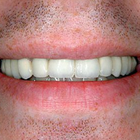
Front view
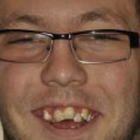

Front view
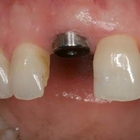
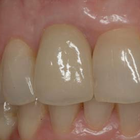
Front view
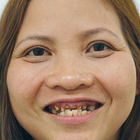

Front view

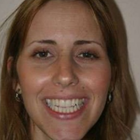
Front view
WHY US?
At Medijump, we're making medical easy. You can search, compare, discuss, and book your medical all in one place. We open the door to the best medical providers worldwide, saving you time and energy along the way, and it's all for FREE, no hidden fees, and no price markups guaranteed. So what are you waiting for?

Free

Best Price

Widest Selection

Risk-Free
What you need to know about Dental Implant in South Korea

A dental implant is a medical device that provide support to artificial teeth. It's surgically placed into the jaw to act as a replacement for the root of a missing or damaged tooth, which in turn serves to hold a replacement tooth or bridge. It functions and looks much like a real tooth, restoring your ability to chew and improves your overall appearance. Dental implant surgery is considered as a better alternative to dentures or bridgework that does not fit well. It also offers a great option for people when they do not have enough natural teeth roots left to build denture or bridgework replacements.
Since dental implants eventually fuse with your jawbone over the span of several months, it won’t make noise, slip, or cause bone damage the way dentures or bridgework might. Dental implants also enable natural speech, look and feel like your own teeth, make eating easier, and improves your appearance. However, the surgery may involve several stages, and, in some cases, it may require two separate visits to the clinic to complete. Ensure to look for a specialist in a reputable clinic for the best results.
What is the cost of Dental Implant in South Korea?
Price differences abound in South Korea for Dental Implant based on the clinic, the proficiency of the surgeon, and the individual requirements of the patients. It's essential to realize that dental insurance usually doesn't cover the entire bill for this treatment, though it might cover a part. Several dental clinics provide finance schemes or payment alternatives to assist in easing the financial burden. For more precise cost estimates, reach out to your dental service provider or a nearby clinic.
What does a Dental Implant Procedure Involve?
Dental implant surgery generally requires several stages. Each stage may be performed under general or local anesthetic. The first stage is removing the damaged tooth. Then, if your jawbone is too soft or not thick enough, your dentist may perform bone grafting to create a more solid base for the implant. The bone graft may be natural (taken from another part of your body) or synthetic (a bone-substitute material). If you only need minor bone grafting, the implant surgery can be performed on the same day. However, if you need a significant amount of bone graft, the implant surgery may have to be postponed until the transplanted bone grows enough new bone to support the dental implant.
The next stage after the damaged tooth removal and bone graft (if you need one) is placing the dental implant. To do this, your dentist makes an incision to expose the bone and puts the metal implant post deep into the bone. At this stage, you will still have a gap where your tooth is missing. Your dentist will place a temporary denture for appearance. Once the metal implant post is placed, osseointegration begins. This is a process where the jawbone grows into the surface of the implant and can take several months to complete. After osseointegration is complete, your dentist will place the abutment, which is a small connector post that will hold your new tooth. The final stage, after the abutment is placed, is placing the crown, which is the tooth-looking part. You can choose between a removable crown and a fixed crown.
How Long Should I Stay in South Korea for a Dental Implant Procedure?
The length of your stay in South Korea for a Dental Implant depends on numerous considerations like the intricacies of the procedure, the quantity of implants required, and your personal recovery process. Each stage of dental implant surgery is done in separate appointments. After each appointment, you should be able to leave the hospital or clinic right away. However, you should stay in South Korea for at least 2 weeks for completion of the work, the initial recovery time, and follow-up checkups.
What's the Recovery Time for Dental Implant Procedures?
The recuperation duration following a Dental Implant or dental implant operation can widely vary and is shaped by multiple aspects. Initial healing of the tissue might require only a handful of days, but complete osseointegration (the fusion of the implant with the jawbone) generally spans several months. This window could be extended for patients requiring auxiliary procedures such as bone grafts, or those with prevailing health issues that may impede the healing process.
Post-procedure, it's not unusual to experience a degree of discomfort, which could manifest as minor pain, swelling of your gums and face, skin and gum bruising, and slight bleeding. Such symptoms are a standard phase of the recovery process and should alleviate within a fortnight. In this interim, it's advisable to stick to a soft diet to not overload the implant site with undue pressure. Any strenuous physical exertion should be put off to circumvent potential complications.
Maintaining excellent oral hygiene is paramount to facilitate healing and stave off infection. Regular brushing and flossing, being particularly gentle around the surgical area, coupled with rinsing your oral cavity with warm saline water, can contribute to keeping the region hygienic.
What sort of Aftercare is Required for Dental Implant Procedures?
After each stage of surgery, you may have to eat soft foods. Since you may experience swelling, bruising, pain, and minor bleeding, your dentist will prescribe pain medications or antibiotics to help ease your discomfort. During your recovery period, you need to avoid smoking as it can contribute to implant failure and complications.
No special care is required for dental implants. Nonetheless, you need to practice good oral hygiene in order to maintain the implant and your remaining natural teeth. Make sure to brush your teeth twice a day, floss daily, and rinse your mouth with an antiseptic mouthwash. You also need to see your dentist regularly and avoid damaging habits, such as chewing hard items.
What's the Success Rate of Dental Implant Procedures?
The efficacy of Dental Implant, alternatively referred to as dental implants, in South Korea, is typically impressive, boasting effectiveness percentages as high as 98% in some studies. This positions dental implants as one of the most reliable procedures within dental care's realm. Nevertheless, it's worth mentioning that the success rates might fluctuate, influenced by several factors.
The patient's overall health is a key determinant of the thriving outcome of a dental implant procedure. Individuals exhibiting optimal health usually witness higher success rates. Pre-existing health issues like diabetes, osteoporosis, and periodontal ailments can theoretically impact the efficacy of the implant.
Additional contributing factors to the success rate encompass the quality and abundance of the individual's bone structure. Patients boasting plentiful, healthy bone are ordinarily the perfect candidates for dental implants. However, those who have experienced bone loss might need to undergo a bone grafting procedure before the implant procedure. This step can provide a robust base for the implant and enhance the chances of a successful result.
Are there Alternatives to Dental Implant Procedures?
If you are not a candidate for dental implant surgery, or you simply do not want to undergo the procedure, you can opt for the alternatives. The alternatives include:
- Mini dental implants, which is a small type of dental implants. The structure is similar to regular dental implants, but are somewhat smaller in size. Unlike regular dental implants, dentists can often place mini implants only in one visit using local anesthesia. You may also be able to use your new teeth on the same day.
- A same-day implant is essentially similar to traditional dental implants. However, your dentist performs the whole process in just one day, skipping the process of wound healing and osseointegration.
- Implant-supported dentures or All-on-4 is an alternative if you need to fix a complete upper or lower set of teeth. During this procedure, four to six implants are placed into your jawbone as a base to attach and stabilize your denture.
What Should You Expect Before and After the Dental Implant Procedure?
Grasping what lies ahead before and post the Dental Implant can lessen potential worries and guarantee you are fully equipped for the upcoming journey. Prior to the procedure, your dental practitioner will conduct an all-inclusive dental assessment. This check-up may encompass dental X-rays and sophisticated 3D imaging to examine the status of your oral cavity.
The dental professional will also explore your medical history. If you're suffering from specific heart disorders or orthopedic implants, your dental practitioner might suggest antibiotics to avert infection. A personalized treatment blueprint, customized to your circumstances, will be constructed. This strategy takes into account factors like the amount of teeth you need substituted and the state of your jawbone. The procedure is typically carried out under local anesthesia to mitigate any discomfort.
Subsequent to the operation, experiencing slight unease is usual. You might witness inflammation of your face and gums, discoloration of your skin and gums, soreness at the insertion area, and insignificant bleeding. Your dental specialist will recommend medications to soothe these indicators. In case inflation, unease, or any other complications intensify in the days post-operation, it's crucial to reach out to your oral surgeon. Post-operation will require you to consume mushy foods as the operated site recovers. Moreover, you'll be guided to abstain from smoking, as it can hinder recovery and influence the triumph of the dental implant.
Following the positioning of the implant, the healing process, and fusion with the bone (osseointegration) transpire over an extended period. During this interval, maintaining robust oral cleanliness is vital. This involves frequent brushing, the use of dental floss, and cleansing with an antibacterial mouthwash. Periodic dental examinations are obligatory to track progress and confirm the well-being and effectiveness of the implant.
What are Potential Risks of Dental Implant?
Despite Dental Implant boasting remarkable effectiveness, it is, as any surgical operation, not without risks and potential difficulties. The chances of encountering these issues are often minute and irregularities are infrequent, yet it remains critical for patients to comprehend these possibilities before undertaking the procedure.
Complications and side effects may include:
- Implant failure
- Nerve injury
- Infection
- Sinus problems
- Damage to surrounding structures, such as other teeth or blood vessels
How long does a Dental Implant last?
The durability of a Dental Implant is heavily reliant on the individual's oral cleanliness and general wellbeing. Nonetheless, with appropriate upkeep and care, dental implants have the potential to stand the test of time. The titanium pillar inserted into the jawbone during surgery is crafted to be everlasting, while the dental cap fastened to the anchor may necessitate substitution every decade or decade and a half due to normal usage. Yet, with outstanding dental management and habitual screenings, the cap has the potential for lifelong endurance.
Whilst the information presented here has been accurately sourced and verified by a medical professional for its accuracy, it is still advised to consult with your doctor before pursuing a medical treatment at one of the listed medical providers
No Time?
Tell us what you're looking for and we'll reachout to the top clinics all at once
Enquire Now

Popular Procedures in South Korea
Prices Start From $1

Prices Start From $1

Prices Start From $48

Prices Start From $1

Prices Start From $1

Prices Start From $11

Prices Start From $1

Prices Start From $45

Recommended Medical Centers in South Korea for Dental Implant

- Interpreter services
- Translation service
- Religious facilities
- Medical records transfer
- Medical travel insurance
- Health insurance coordination
- TV in the room
- Safe in the room
- Phone in the room
- Private rooms for patients available

- Interpreter services
- Translation service
- Religious facilities
- Medical records transfer
- Medical travel insurance
- Health insurance coordination
- TV in the room
- Safe in the room
- Phone in the room
- Private rooms for patients available

- Interpreter services
- Translation service
- Religious facilities
- Medical records transfer
- Medical travel insurance
- Health insurance coordination
- TV in the room
- Safe in the room
- Phone in the room
- Private rooms for patients available

- Interpreter services
- Translation service
- Religious facilities
- Medical records transfer
- Medical travel insurance
- Health insurance coordination
- TV in the room
- Safe in the room
- Phone in the room
- Private rooms for patients available

- Interpreter services
- Translation service
- Religious facilities
- Medical records transfer
- Medical travel insurance
- Health insurance coordination
- TV in the room
- Safe in the room
- Phone in the room
- Private rooms for patients available

- Interpreter services
- Translation service
- Religious facilities
- Medical records transfer
- Medical travel insurance
- Health insurance coordination
- TV in the room
- Safe in the room
- Phone in the room
- Private rooms for patients available

- Interpreter services
- Translation service
- Religious facilities
- Medical records transfer
- Medical travel insurance
- Health insurance coordination
- TV in the room
- Safe in the room
- Phone in the room
- Private rooms for patients available

- Interpreter services
- Translation service
- Religious facilities
- Medical records transfer
- Medical travel insurance
- Health insurance coordination
- TV in the room
- Safe in the room
- Phone in the room
- Private rooms for patients available

- Interpreter services
- Translation service
- Religious facilities
- Medical records transfer
- Medical travel insurance
- Health insurance coordination
- TV in the room
- Safe in the room
- Phone in the room
- Private rooms for patients available

- Interpreter services
- Translation service
- Religious facilities
- Medical records transfer
- Medical travel insurance
- Health insurance coordination
- TV in the room
- Safe in the room
- Phone in the room
- Private rooms for patients available
Dental Implant in and around South Korea
About South Korea
South Korea’s population is 51 million and it's capital Seoul is a major world city. 50 percent of the country’s population lives within the Seoul Capital Area which includes Seoul, Incheon, and Gyeonggi-do. The capital is situated in the north-west region of the country.
The Republic of Korea has immense potential for medical tourism with futuristic hospitals, sophisticated technologies, and advanced procedures. The government is taking all measures to make the country a top medical tourism destination. By 2022, it is looking to receive 998,000 medical tourists in the country.
Tourists from the USA, UAE, and Japan travel to Korea for affordable treatments. Some medical institutions in South Korea offer price packages, especially for plastic surgery, and help the medical tourist to save up to 40 percent on the treatment, even after adding travel and accommodation costs.
The Country has 27 accredited JCI-certified state-of-art hospitals. Severance Hospital, Seoul National University Hospital, and JK Plastic Surgery Centre are the most renowned hospitals within South Korea for medical tourism. The Doctors are well-educated to international standards of certifications and training.
The country is popular for treatments and procedures in several medical specialties, with an excellent track record for success and survival rates. Cancer treatment, plastic surgery, cardiovascular procedures, orthopedics, and preventive health check-ups are the top five areas for medical tourism in Korea.
Popular Parts of South Korea
When considering South Korea, it would be a mistake to overlook its many offerings that stretch way beyond the confines of its dynamic capital, Seoul. This vibrant nation is the embodiment of a perfect blend of advanced urban slickness, serene yet majestic rustic charm, awe-inspiring scenic beauty, and serene coastal landscapes with pristine beaches. Everywhere you go, each region unravels a story and invites you to become part of its unique narrative.
Notably, South Korea teems with places that make for intriguing and memorable visits. These locales, scattered across the country, are an intriguing cocktail of experiences, extending from modern high-tech cities shrouded in electrifying energy to tranquil, time-honoured folk villages nestled amongst nature's wonder, where tranquillity prevails and tradition holds sway.
- Seoul – The capital city is a mix of pop and party culture, modern architecture, scenic parks, and glittering promenades and it is also rich in history and culture. The National Museum, War Memorial, Changdeokgung Palace, and Bukchon Hanok Village are some of the key attractions in Seoul.
- The Korean Demilitarized Zone (DMZ) – DMZ is one of the most important places in South Korea as you will get a better knowledge of the troubles between North and South. When you book a DMZ 3rd tunnel tour, make sure it includes the tram ride up and down the tunnel, or you will be in for a long walk. You can also get a glimpse of North Korea from the Observation Post in DMZ.
- Busan - Is the second largest city of South Korea and is well known for hosting Asia’s biggest international film festival. It is also a unique blend of modern skyscrapers, majestic mountains, picturesque beaches, and magnificent Buddhist temples. Haedong Yonggungsa Temple and the Jagalchi fish market are some of the popular sites.
- Jeju Island –Has beautiful white sandy beaches, volcanic craters, and lava caves, and the botanical gardens will take your breath away. Hyeopjae & Hamdeok beach, Cheonjiyeon Waterfalls, and Seongsan Sunrise Peak are some of the interesting places on this island.
- Gyeongju –This coastal city has a large collection of cultural and historical sites dating back a thousand years. It gives you a peek into its cultural roots through the UNESCO World Heritage site, Bulguksa Temple, and the National Museum.
Seoraksan National Park, Incheon, and Pyeongchang County are a few other places to visit in South Korea.
Weather and Climate in South Korea
South Korea's climate is particularly noteworthy as it is blessed with distinct four seasons, each acquiring a unique charm. The rhythm of nature's cycles is quite pronounced and experienced vividly throughout the country. Spring flamboyantly arrives with blooming flowers and warmth, followed by summer's bright and sunny constitution. Autumn then takes over, painting the landscapes with artistic hues of red and gold, and finally, winter wraps up the cycle by painting the country white with its quiet snowfall.
- Summers are from June to August and are hot, humid, and rainy. There can be heavy rainfall in July and August.
- Winters are from late November to mid-March. During winter, it is freezing cold in the north and the interiors and mild along the southern coasts and snowfalls are rare.
- Spring is from mid-March to May. It is cold at the beginning of the season and gradually becomes milder. Rainfall becomes more frequent with the formation of low-pressure systems.
- Autumn is from September to late November and this is a pleasant season and during October the highest temperature is around 68 to 72°F. Rainfall is considerably less than in spring.
The average temperature in Seoul in January is around 73.4 to 81.5°F and in July its 71° to 75°F.
Getting Around in South Korea
Incheon International Airport at Seoul handles many daily flights from North America. Many of which are non-stop from San Francisco, Los Angeles, and Atlanta. Korean Air, United, and Delta Airlines operate a lot of these flights. Seoul is also reachable from its other Asian neighbors, Europe, and the middle-east. Other international airports in South Korea are located in Busan, Cheongju, and Jeju.
Gimpy International Airport, also in Seoul, handles domestic flight operations. You can connect to the Seoul Subway System, and to Incheon Airport by the Arex Train System.
Train travel is the most convenient and economical way to get around in South Korea. You can buy a KORAIL rail pass when you arrive at the airport. South Korea’s high-speed bullet train, the KTX, connects Seoul to Busan within 3 hours and It also connects to the other major cities within South Korea.
The Seoul Bus Terminal and the Central City Terminal operate buses to all of the cities. Bus travel is inexpensive and efficient, and fairly empty traveling to the smaller cities. Renting a car is also an option, but expensive.
Tourist Visas in South Korea
South Korea has an agreement with 117 jurisdictions for a visa-waiver. Visitors from countries under the visa-waiver program, such as the USA, Japan, EU countries, and New Zealand can enter the country without a tourist visa. Tourists can stay for up to 90 days with a valid passport. Canadians can enter visa-free and stay up to 180 days.
For citizens hailing from most Asian countries, including India and China, and also from Russia, planning a trip to South Korea involves obtaining a tourist visa. The South Korean government enforces travel protocols that require individuals from these nations to secure proper documentation prior to their visit, ensuring that travel regulations are adhered to and creating a simple and systematic process.
This prerequisite visa policy is a standard procedure which intends to streamline the influx of tourists and visitors from these specific nations. Each application undergoes a careful assessment to guarantee that all rules and regulations proposed by the South Korean authorities are in place. It constitutes a critical aspect of aiding security measures, maintaining immigration transparency, and promoting cultural exchange in a regulated manner. Thus, it is an imperative that citizens of these countries, such as India, China, and Russia, procure a tourist visa before embarking on their journey to discover the marvels of South Korea.
Additional Information
- Korean Republican Won (KRW) is the currency of Korea. One US dollar converts to 1,342.95 KRW.
- You can exchange most of the major currencies to KRW in banks and currency exchanges. US dollars and Euros are the easiest to convert.
- You can withdraw money from the many ATMs. Or you may even use credit cards for payments in South Korea.
- Korean and Korean Sign Language are the official languages of South Korea. Hangul is the formal script.
- 56.9% of the people are non-religious. Among the religious population, the majority are Christians. Others follow Korean Buddhism.
- The culture of South Korea is a blend of ancient Korean culture with ancient Chinese and Japanese cultures. Respect for elders is an important aspect of their culture.
- New Year Day (falls in February as per lunar calendar), The Birthday of Buddha (early May), Independence Day (March 1), Memorial Day (June 6), Constitution Day (July 17) are a few important holidays in the Republic of Korea.
Popular Searches
- Plastic Surgery in Thailand
- Dental Implants in Thailand
- Hair Transplant in Thailand
- Breast Augmentation Thailand
- Gastric Sleeve in Thailand
- Gender Reassignment Surgery in Thailand
- Laser Hair Removal in Bangkok
- Botox in Bangkok
- Dermatology in Bangkok
- Breast Augmentation in Bangkok
- Coolsculpting in Bangkok
- Veneers in Turkey
- Hair Transplant in Turkey
- Rhinoplasty in Turkey
- Stem Cell Therapy in Mexico
- Rhinoplasty in Mexico
- Liposuction in Mexico
- Coolsculpting in Tijuana
- Rhinoplasty in Korea
- Scar Removal in Korea
- Gastric Sleeve in Turkey
- Bone Marrow Transplant in India
- Invisalign in Malaysia
- Plastic Surgery in the Dominican Republic
- Tummy Tuck in the Dominican Republic
- Plastic and Cosmetic Surgery in Poland
- Rhinoplasty in Poland
- Hair Implant in Poland
- Dental Implants in Poland
- IVF in Turkey











